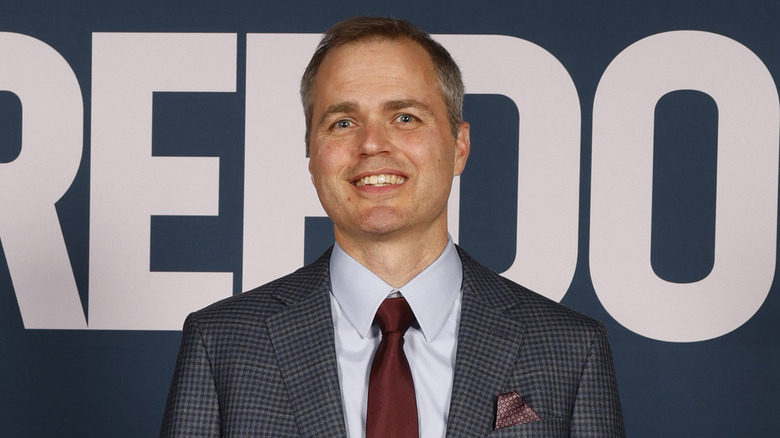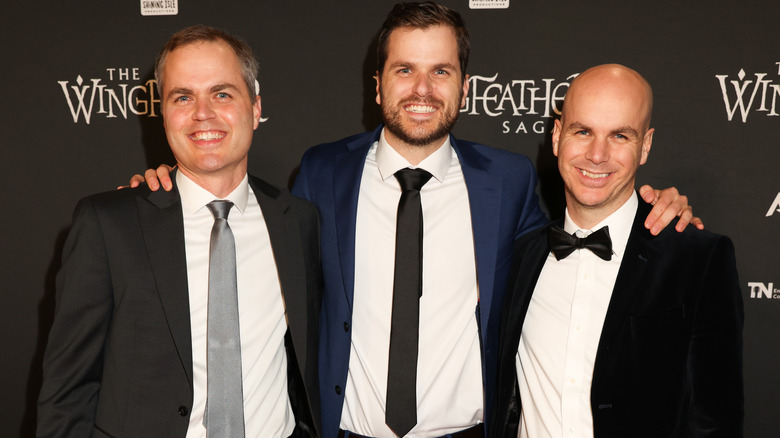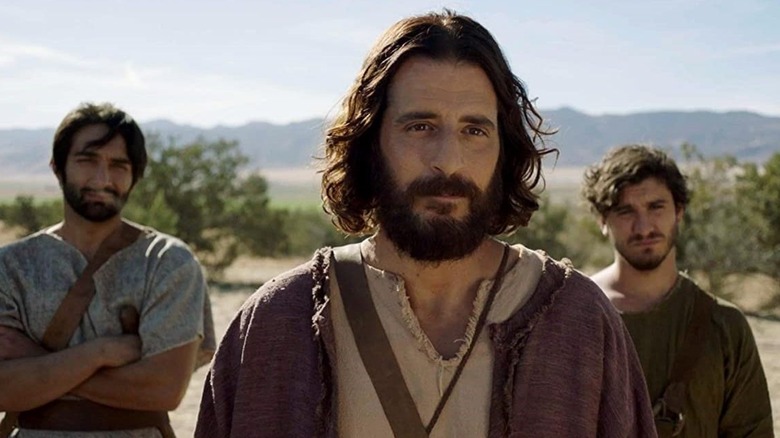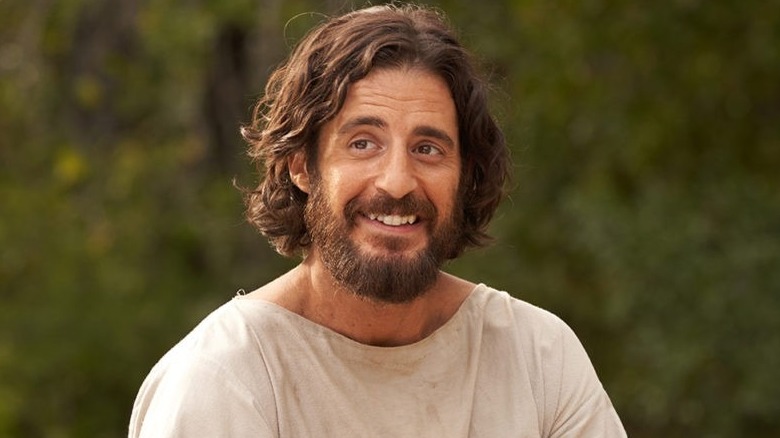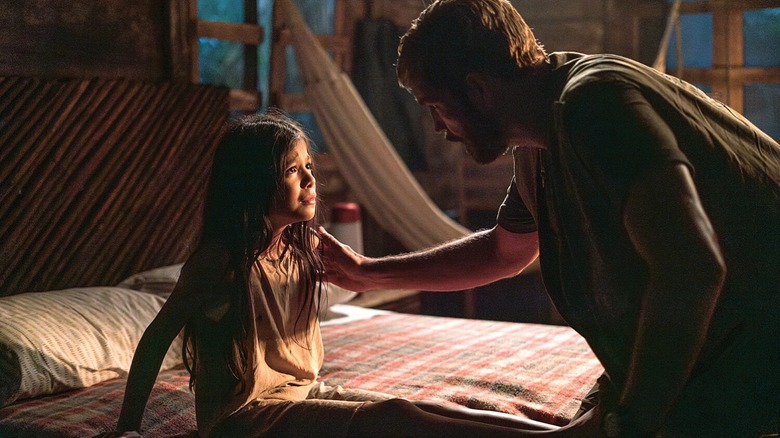The Untold Truth Of Angel Studios
With the unexpected blockbuster "The Sound of Freedom," Angel Studios is suddenly receiving loads of attention from movie audiences, film critics, and wider media alike. The film, which puts a spotlight on the horrifying nature of child trafficking, starring controversial actor Jim Caviezel, has become the talk of Hollywood and is shaking up the industry.
To the surprise of some, though, Angel Studios has actually been around longer than the Jim Caviezel film, and had a separate business as a streaming service years earlier that most viewers have never even heard of. In fact, they even tussled with some major movie studios in a high-profile legal battle while on their rise to box office success. Their library of content, meanwhile has some unusual and long-running — albeit largely obscure — entries.
But what is Angel Studios, and how did it seemingly come out of nowhere to release one of the biggest films of 2023? Well, we've done the digging and found out all the details about these film distributors. From their earliest struggles to get their projects off the ground to their unlikely methods of fundraising and their latest claim to fame, this is the untold truth of Angel Studios, the people behind the action thriller "The Sound of Freedom."
Angel Studios was founded by a Mormon farmboy
Co-founder and CEO of Angel Studios, Neal Harmon, is an unlikely Hollywood success story. A self-described Idaho farmboy, he's a devout Mormon who attended Brigham Young University, where he received his Bachelor's degree in American studies, and a Master's degree in instructional psychology and technology. From there, Harmon took a strange path to becoming the owner of an up-and-coming movie studio. After his graduation in the late 1990s, Harmon was a proselyting missionary for the Church of Jesus Christ of Latter-day Saints, a role that took him to Ohio, Kentucky, and Mexico.
Early in his career, Harmon was deeply involved in education, serving as director for Family Literary Centers, before founding the software company FamilyLearn.com. But he also worked heavily in digital marketing, helping companies like Poo-Pourri (the bathroom air freshener) and Orabrush (an oral hygiene tongue scraper), while also running the Neal S. Harmon Company, which was a jack-of-all-trades that did everything from shipping and trucking logistics to online promotional programs. According to Harmon, the company also holds the world's first sandwich patent.
In 2013, Harmon started a very different kind of venture, a small streaming service called VidAngel. Focused on religious values and conservative families, the service aimed to allow parents and other movie viewers the ability to watch their favorite films with graphic material, like sex and violence, removed.
VidAngel gave life to Angel Studios
Angel Studios, which funds and produces its own films — including "The Sound of Freedom" — actually evolved from Harmon's earlier company, VidAngel. A modest enterprise at first, it eventually grew to around 50 employees, exploiting a gap in the market of movie delivery services. But in their attempt to provide home viewers with family-friendly content that reflected their conservative principles, they found that there really wasn't enough being produced to meet the needs of people who shared their values. In a 2004 blog post on his own website, Harmon put it succinctly, pondering, "What ever happened to the family film?"
"We were feeling the need for great storytelling in our homes that matches our values," Harmon told EWTN in 2022. "And we learned that they are a lot of other people who felt the same as we did, so we started [Angel Studios] with that purpose." To make the content that he and his community wanted to see, Harmon and his fellow co-founders — brothers Jeffrey, Jordan, and Daniel alongside cousin Benton Crane — took their experience from VidAngel and threw all their eggs into the entertainment production basket, ditching their attempt to sanitize existing films.
In 2022, VidAngel relaunched and remains a viable alternative for conservative families. It even works with services like Amazon Prime, Netflix, and Paramount+ to stream filtered versions of the best movies and TV shows on demand. But now, with offshoot Angel Studios, they have another service that can provide original content.
Angel Studios was born out of a massive legal battle with Disney and Warner Bros.
A desire to make their own movies may have spurred the launch of Angel Studios, but it was helped along by some serious legal troubles faced by VidAngel in 2016. That year, four major studios — led by Disney and Warner Bros. — banded together to file a lawsuit against the nascent movie service with accusations that they'd hacked the copyright protection on their home video releases, violating the DMCA Act and effectively making them an unlicensed video delivery platform.
Once filed, the court issued a preliminary injunction against VidAngel, effectively shutting down their business. While the company fought the injunction, their request to stay the move was denied by the court, and later upheld by a subsequent appeals court. After the injunction was lifted in June 2017, they started a subscription-based streaming model that filtered movies and TV shows from Netflix, Amazon, and HBO, though those services did not voluntarily participate. Subscribers were required to have their own accounts that would be tied into the service.
The rising costs of the lawsuit with the major studios forced them into Chapter 11 bankruptcy later that year. The Harmons sold off the content-filtering business, and decided to put all of their focus into producing and distributing their own movies. In 2022, the studios settled the lawsuit with VidAngel.
Angel Studios has largely relied on crowdfunding
Since the Harmons first formed VidAngel, they haven't gone the usual routes that most movie studios use to raise capital to fund their projects. Instead, they've chosen equity crowdfunding, which they state on their website relies on "the tastes, opinions, and feedback of our audience members."
First, the studio conducts surveys of their viewers (who they refer to as the Angel Guild), which help them decide on what their next project will be. Then, once the people have spoken, they go through equity crowdfunding, allowing their own fans to invest in a show or movie in exchange for partial ownership in Angel Studios. In addition, the company also utilizes regulation crowdfunding, which pools smaller contributions together from individuals to raise large sums of money.
"The Chosen," for example, raised more than $10 million through Regulation A+ funding in 2018, with $1 million more a year later. These days, their success through crowdfunding has led to expanded investments, and in 2022 they announced a $47 million dollar infusion of cash from venture capitalists Gigafund, who were aided with dollars provided by previous equity crowdsourcing companies like Alta Ventures and Kickstart Fund. So far, the method has proven successful, and Angel Studios announced a 120% repayment of investor funds for the project "His Only Son" in 2023.
Angel Studios is about more than just movies
Though "The Sound of Freedom" is likely the first major release from Angel Studios that you've heard of, the Harmons have actually been producing content for several years. Beyond the new Jim Caviezel film, Angel Studios is also responsible for a number of movies and several successful TV shows, and even a few animated series. Their first production was a TV series, "Dry Bar Comedy," a stand-up show that has been running since 2017, with over 200 episodes produced.
In 2019, when they were still known as VidAngel, they launched their first scripted series, the historical drama titled "The Chosen," centered on the life of Jesus Christ. The series aired its third season in 2023. Two years later, Angel Studios debuted their first kids' cartoon, "The Tuttle Twins" — based on a childrens' book series that has faced criticism by Current Affairs and others for being right-wing propaganda — and in 2022, followed it with "The Wingfeather Saga," an animated fantasy series based on a line of young adult novels.
On the feature film side, "Sound of Freedom" isn't their first effort either. It was preceded by "His Only Son," another biblical drama, focused on the life of Abraham from the Old Testament. Next up on the docket for the studio is "The Shift," a science fiction thriller about the struggle to maintain faith against the backdrop of a futuristic society. If you are noticing a theme here ... well, that's intentional.
They focus on religious stories
If it hasn't become obvious by now, Angel Studios' main drive is to produce content focused on faith. Growing out of their previous company VidAngel, the Harmons feel it's important to give audiences an alternative to what they perceive to be violent, sexual movies and shows in modern entertainment. "What are the values we want to see for our children and our grandchildren," asked Neal Harmon in an interview with Deseret News in 2023.
The studio's catalog, as a result, contains a number of films and television shows that are either religious in theme or tone. Chief among these is the studio's mult-season biblical epic "The Chosen," about to enter its fourth season.
When it comes to the more action-heavy "Sound of Freedom," Harmon describes it as a story of real-life aspirational heroes fighting against evil. While it contains serious themes, the studio intends for it to be watched by families and teens.
The Sound of Freedom is their first hit -- albeit with a caveat
Released in July 2023, "The Sound of Freedom" is an action thriller starring Jim Caviezel about a former government agent who takes it upon himself to bring down a child trafficking ring. After just two weeks in theaters, "The Sound of Freedom" grossed more than $85 million, making it already one of 2023's biggest movies, although its box office receipts have already been called into question, based on the studio's "Pay It Forward' strategy, in which supporters can essentially donate to the studio without actually seeing the film.
The film has also faced criticism from Rolling Stone, which called the film "a triumph for QAnon believers." Considered by many a movement based on wild, irresponsible, and downright dangerous conspiracy theories that have been thoroughly debunked by every reputable organization and outlet, QAnon sits at the center of the film's controversial success, with many of its followers touting the film as a vindication for their movement. Author Mike Rothschild put it simply, telling NPR, "It's being marketed to QAnon believers, it's being embraced by this community and its leading actor is a huge part of the QAnon community."
Regardless of the divisive nature of the film, "The Sound of Freedom" stands to raise the profile of the little-known Angel Studios.
Disney held the rights to Sound of Freedom and refused to release it
Despite being Angel Studios' biggest hit to date, "The Sound of Freedom" wasn't actually produced by them. It was produced years ago, with filming coming to a close all the way back in 2018. The producers, Santa Fe Films, inked a deal with 20th Century Fox to distribute the movie, but almost immediately after, the studio was acquired by the Walt Disney Company. Subsequently, "The Sound of Freedom" was caught in limbo, and ultimately its new owners decided to have it shelved.
"This film started eight years ago and it was finished almost five years ago, the distribution rights were owned by Fox," Harmon told Marvel Latin News. "Fox was acquired by Disney, and Disney said "we can't release this film." Eventually, though, the film's producer Eduardo Verástegui reacquired the rights. After another lengthy delay due to the ongoing COVID-19 pandemic, in March 2023, Harmon and Angel Studios discovered that the film was available. Together with the support of the Angel Guild — a group of more than 100,000 previous crowdfunding investors — they decided it was the right project for the studio.
Angel Studios wants to change how Hollywood works
With Angel Studios utilizing crowdfunding for their money-raising efforts, it's easy to think they're just looking to make movies without having to shell out any of their own money. But the Harmons have more in mind than just making religious movies and TV shows with the money given to them by their fans. They're also motivated to offer up a greater degree control over entertainment to their conservative base, a group they consider to have been neglected by Hollywood filmmakers.
From the very start with VidAngel, the Harmons wanted to give traditional viewers the ability to remove sensitive content from movies they didn't want to see. Regardless of how this impacts filmmakers, who are often understandably frustrated at the alteration of their creative vision without consent, and studios, who aren't happy with the appropriation of their property, the Harmons persist in this effort.
They don't see themselves as political
As QAnon supporters claim "The Sound of Freedom" as their rallying cry, Harmon and Angel Studios have been met with a steady stream of criticism for pushing their own religious and political agenda that aligns with the ideology of dangerous extremists. Vox chronicled a strange phenomenon where conspiracy theorists have begun spreading rumors about movie theater chains intentionally trying to keep audiences away, and it doesn't help that the film is full of propaganda-like misinformation on child trafficking.
Nevertheless, CEO Neal Harmon insists that the film is not political. "Everyone who's seen this film knows that it has nothing to do with politics or conspiracy, and that it's just a great, true story, well-told," Harmon said in a chat with the Daily Signal. "If you're on the fence about it, you want to see for yourself ... you can find out for yourself what this phenomenon is about."
But considering the studio's recruitment of cast members and producing partners who have been outspoken with their controversial political beliefs, and a vast swath of ardent supporters who espouse fringe right-wing conspiracy theories — to say nothing of the founders' almost exclusive focus on Christian stories — it's hard to escape feeling like the studio is pushing a conservative political agenda. Particularly as indicted former president Donald Trump has been openly promoting the film, and stoking fears of child trafficking to demonize his opponents. No matter what the studio claims their intention was with this film, the criticism is likely to follow them for years to come.
They believe The Sound of Freedom is the next Schindler's List
Controversial leading man Jim Caviezel, star of "The Sound of Freedom," wants to make clear the sacrifices he's made to get the film to the screen. Portraying himself as a martyr to the cause of child trafficking, Caviezel — who played Jesus Christ himself in Holocaust-denier Mel Gibson's "The Passion of the Christ" — claims to have suffered for the audience's sake, and destroyed his own career to help what he feels is a righteous cause.
"I want this to be so huge that they're forced to look at this. I lost my agents over this," he said during the film's press tour. "I lost my lawyer over this, and now I understand why all these actors didn't want to do the movie because of this. Listen, you do 'Schindler's List' 50 years later, you're a hero. Try doing 'Schindler's List' when the real Nazis are right there. Understand how that becomes more dangerous?"
Faced with criticism from the media, movie critics, and even audiences, Caviezel has dug in his heels and fought back, adamant that he get the film made. And now, the beleaguered actor considers himself a winner in the battle for his acting soul now that "The Sound of Freedom" is a hit — though it remains to be seen if he can parlay it into a broader comeback.

